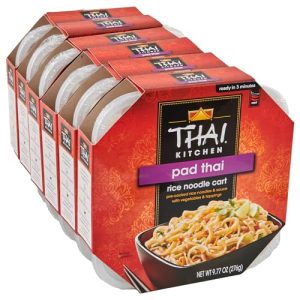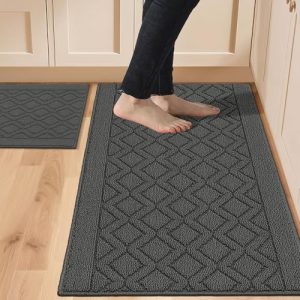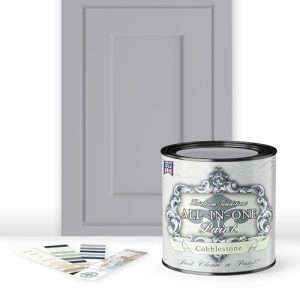Have you ever cooked a delicious meal only to be left with lingering smoke filling your kitchen? That smoky haze not only clouds your space but can also leave your eyes stinging and your clothes smelling.
You might be wondering: can an air purifier really clear kitchen smoke effectively? If you’ve been searching for a way to breathe easier and keep your kitchen fresh, this article will give you the answers you need. Keep reading to discover how air purifiers work against kitchen smoke and what you can do to make your cooking area cleaner and healthier.
How Kitchen Smoke Affects Air Quality
Kitchen smoke can quickly change the air quality in your home. It’s more than just a temporary nuisance—it can carry harmful particles and odors that linger long after cooking is done. Understanding how kitchen smoke affects your indoor environment helps you decide if an air purifier can truly make a difference.
Sources Of Kitchen Smoke
Smoke in the kitchen usually comes from burning or overheating food. Frying, grilling, and broiling produce visible smoke and invisible gases.
Other sources include:
- Burnt oils and fats
- Charred spices and herbs
- Smoking appliances like toasters or ovens
Even using certain non-stick cookware at high temperatures can release fumes that affect air quality.
Health Risks Of Indoor Smoke
Breathing in kitchen smoke often exposes you to tiny particles called PM2.5. These particles can penetrate deep into your lungs and cause irritation.
Short-term effects might include coughing, headaches, or watery eyes. Over time, repeated exposure can worsen asthma or other respiratory problems.
Have you noticed feeling uncomfortable or having breathing issues after cooking? That’s your body reacting to poor air quality.
Common Odors And Particles
Kitchen smoke carries a mix of odors and particles that settle on surfaces and hang in the air. These include:
- Smoky or burnt smells from charred food
- Greasy residues that cling to walls and fabrics
- Microscopic particles that you can’t see but can breathe in
These odors can make your home feel stuffy and unpleasant, even hours after cooking. Have you ever struggled to get rid of that lingering burnt smell? It’s a sign your indoor air quality is compromised.
Air Purifiers And Their Role
Air purifiers play a key role in improving indoor air quality. They remove particles, odors, and harmful gases. In kitchens, smoke and cooking smells can linger and affect comfort. Air purifiers help reduce these pollutants but have limits. Understanding their types and technologies helps set clear expectations for kitchen use.
Types Of Air Purifiers
- HEPA Purifiers:Capture tiny particles like smoke and dust.
- Activated Carbon Purifiers:Absorb odors and chemical fumes.
- Ionizers:Release charged ions to remove particles from the air.
- UV Purifiers:Kill bacteria and viruses but do not remove smoke.
Filtration Technologies
HEPA filters trap particles as small as 0.3 microns. Smoke particles usually fall in this range. Activated carbon filters capture gases and odors effectively. Some air purifiers combine both filters for better results. Ionizers cause particles to stick to surfaces, but can create ozone. UV light targets microbes, not smoke or odors.
Limitations In Kitchen Environments
Air purifiers cannot remove all smoke quickly. Heavy cooking smoke needs good ventilation too. Grease and moisture may clog filters faster. Large smoke particles can settle on surfaces before being filtered. Purifiers work best with open windows or exhaust fans. Regular filter changes are essential to maintain performance.
Effectiveness Of Air Purifiers Against Kitchen Smoke
Kitchen smoke contains tiny particles and strong odors. Air purifiers help reduce these pollutants. Their effectiveness depends on the type of smoke and purifier used. Understanding their strengths helps set realistic expectations for cleaner air after cooking.
Smoke Particle Removal
Air purifiers use filters to trap smoke particles. HEPA filters capture most tiny particles from cooking smoke. This reduces the visible haze and harmful dust in the air. Some purifiers also use electrostatic or activated carbon filters to improve particle capture. The size and speed of the purifier affect how fast smoke clears.
Odor Reduction Capabilities
Smoke odors come from volatile organic compounds (VOCs). Activated carbon filters absorb many of these odor-causing gases. This helps lower the smell of burnt food or smoke. The amount of carbon in the filter impacts odor removal power. Regular filter changes keep the purifier effective against smells.
Real-world Performance
Air purifiers work best in small to medium kitchens. Strong smoke from frying or grilling may need extra ventilation. Placement of the purifier is key—it should be near the smoke source. No purifier can clear smoke instantly, but they improve air quality over time. Combining purifiers with open windows or exhaust fans gives better results.
Best Features For Kitchen Air Purifiers
Choosing the right air purifier for your kitchen is important. Kitchens produce smoke, odors, and tiny particles during cooking. A good purifier removes these pollutants effectively. Some features make purifiers better suited for kitchens.
Focus on filters that capture smoke and smells. Also, consider how well the purifier moves air and covers your kitchen size. These factors improve air quality quickly and keep your kitchen fresh.
Hepa Filters
HEPA filters trap small particles like smoke and dust. They remove up to 99.97% of particles as small as 0.3 microns. This helps clear smoke particles from the air. HEPA filters also reduce allergens from cooking. They keep the kitchen air cleaner and safer.
Activated Carbon Filters
Activated carbon filters absorb odors and gases. Kitchen smoke often carries strong smells. Carbon filters capture these odors well. They help remove smoke smell after frying or grilling. These filters also reduce harmful gases like volatile organic compounds (VOCs). Carbon filters improve air freshness.
Airflow And Coverage Area
Good airflow moves polluted air through the purifier fast. A strong fan helps clear smoke quickly. Check the purifier’s coverage area before buying. It should match or exceed your kitchen size. Proper airflow and coverage ensure clean air reaches all corners. This keeps the entire kitchen environment fresh.
Complementary Methods To Reduce Kitchen Smoke
Reducing kitchen smoke effectively often requires more than just relying on an air purifier. While air purifiers can capture some particles, combining them with other practical methods makes a bigger difference. Addressing kitchen smoke from multiple angles helps keep your cooking space clearer and more comfortable.
Ventilation Solutions
Good ventilation is your first line of defense against kitchen smoke. Installing a powerful range hood above your stove can capture smoke right where it starts. If a range hood isn’t an option, opening windows or using exhaust fans helps push smoke outside quickly.
Have you ever noticed how quickly smoke clears when you crack a window? That airflow makes a huge difference. Even a small fan pointed toward an open window can speed up smoke removal, keeping your kitchen air fresher.
Cooking Habits To Minimize Smoke
How you cook affects the amount of smoke produced. Using lower heat settings and avoiding burning oils reduces smoke dramatically. Try covering pans with lids to trap steam and prevent grease particles from escaping.
Choosing cooking oils with higher smoke points, like avocado or grapeseed oil, also helps. You might find that simple changes in temperature control and ingredient choices cut down on smoke more than you expect.
Regular Maintenance Of Appliances
Dirty appliances can worsen smoke problems. Grease buildup in ovens, stoves, and range hoods can ignite and create extra smoke. Clean these appliances regularly to keep them working efficiently and safely.
Checking filters and replacing them as needed keeps your range hood effective. Have you checked your appliance’s condition lately? It might be time for a quick cleaning session to breathe easier during your next cooking adventure.
Top Air Purifiers For Kitchen Smoke
Kitchen smoke can be a persistent problem. It affects air quality and comfort. An effective air purifier can help. It removes smoke and improves indoor air. Many models are available to fit different needs and budgets. Some offer smart features for added convenience.
High-rated Models
Several air purifiers stand out for kitchen use. They have high ratings and strong features. These models are efficient in removing smoke particles. They often include HEPA filters. These filters trap tiny particles. Brands like Dyson and Honeywell offer reliable options. They have powerful fans and advanced filtration systems.
Budget-friendly Options
Not everyone wants to spend a lot. Affordable air purifiers also tackle kitchen smoke. They balance cost and performance well. Brands such as Levoit and Pure Enrichment provide good choices. These models are compact and efficient. They often include carbon filters. This helps in reducing smoke odors.
Smart Features
Some air purifiers come with smart features. These make them easy to use. Features include Wi-Fi connectivity and app control. Users can adjust settings remotely. Real-time air quality monitoring is also available. This ensures your kitchen air stays fresh. Brands like Philips and Coway offer such models. They combine smart tech with strong filtration.
Frequently Asked Questions
Can An Air Purifier Remove Kitchen Smoke Effectively?
Yes, air purifiers can reduce kitchen smoke by filtering out smoke particles. However, their efficiency depends on the purifier’s filter type and power. HEPA and activated carbon filters work best for smoke removal, but strong smoke may require additional ventilation.
What Type Of Filter Clears Kitchen Smoke Best?
Activated carbon filters are most effective at absorbing smoke odors and gases. HEPA filters capture fine smoke particles. A combination of both filters in an air purifier offers the best results for clearing kitchen smoke and improving air quality.
How Fast Can An Air Purifier Clear Kitchen Smoke?
The speed depends on the purifier’s size, power, and room size. High-capacity air purifiers can clear smoke within 15 to 30 minutes. Smaller units may take longer, especially in large or poorly ventilated kitchens.
Does An Air Purifier Eliminate Smoke Odor Completely?
Air purifiers with activated carbon filters reduce smoke odor significantly. However, complete odor removal may not occur if smoke is heavy or continuous. Combining an air purifier with good ventilation improves odor elimination.
Conclusion
An air purifier can help reduce kitchen smoke but cannot remove it all. It works best with proper ventilation and regular cleaning. Choosing the right purifier with a HEPA filter improves air quality. Still, cooking habits matter to keep smoke low.
Air purifiers support fresher, cleaner kitchen air every day. They are a useful tool, not a complete solution. Keep smoke levels down by combining purifier use with good kitchen practices. This way, your kitchen stays healthier and more comfortable.

Sophie Hartwell is the founder of KitchenQuik.com, where she shares kitchen tips, smart cooking hacks, and the best product picks to make everyday cooking easier and more enjoyable.




